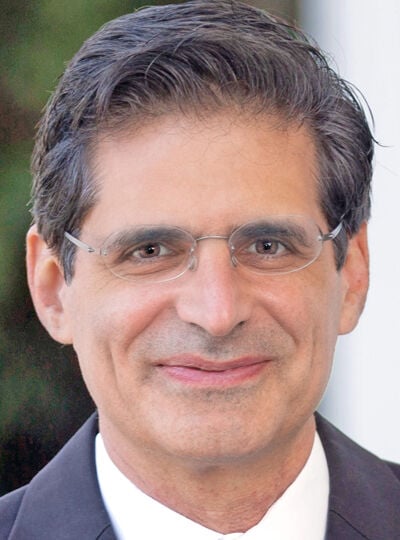A push to electrify buildings and transportation — and make sure the grid is powered by clean energy and can handle the added load — got a boost this week with a package of bills by state Sen. Josh Becker clearing the Senate.
The San Mateo Democrat has made a pragmatic approach to climate policy a staple of his legislative efforts since being elected in 2020, and the bills, he said, are part of a roadmap to get the state to net zero carbon emission by 2045, a goal set by former Gov. Jerry Brown in 2018.
“I try to be very metrics driven in my approach to climate. We produce 420 million metric tons [annually], and we have to get to zero, and we’re currently reducing about 1% a year, so we have to dramatically speed that up,” he said.
Key among his bills, which will still need to clear the Assembly and be signed off on by the governor before becoming law, is a rule that would require hourly reporting from energy producers indicating how much of electricity produced is clean. It would be a big jump from the annual reporting currently required, and according to Becker, an integral first step to reducing fossil fuel-burning production methods.
“A big focus is to electrify transportation and electrify buildings, but you don’t get any of the benefits of that unless we clean our grid, our grid is about 50% clean right now,” he said.
Transportation accounts for 40% of the state’s greenhouse gas emissions, and residential and commercial buildings are responsible for another 25% when accounting for fossil fuels consumed on-site and electricity demand, according to the California Air Resources Board. A major push regionally has been to electrify both sectors by adding electric car charging infrastructure, transitioning to electric buses and trains, and converting to electric heaters and appliances in buildings, among other efforts.
But with renewable energy sources like wind and solar often limited in their ability to provide power throughout the day, and year, and energy storage capacities still limited, relying on green electricity can be tricky — particularly when peak usage times occur when the sun isn’t shining or wind isn’t blowing. Additionally, utilities often purchase “renewable energy certificates” at the end of the year to offset fossil fuel burning, Becker explained.
“With annual accounting, you can be 100% renewable while still burning a lot of fossil fuels as a utility,” he said. “We have to be investing in things like offshore wind, things like long duration storage, things like geothermal.”
The legislation, Senate Bill 1158, would impact community choice aggregation program like Peninsula Clean Energy, municipal utilities and those investor-owned like Pacific Gas and Electric. Becker said Peninsula Clean Energy has already been a leader in the effort with its plan to provide 100% renewable energy by 2025. But he said he still hasn’t received support from municipal utilities.
“You’ve got entrenched interests in the energy sector,” he said. “Some of it’s going to be direct opposition.”
Of his other bills, SB 1203 would establish a goal for state agencies to reach net zero emissions 10 years ahead of the 2045 goal for the entire state economy. Becker said the goal would help identify challenges ahead of time and required the state to help drive markets in the right direction.
“If we’re going to ask the rest of society and all our companies to be net zero by 2045, the government needs to lead the way,” he said. “It’s also going to show us the challenges and the obstacles we’re going to have on the way, so that’s the big idea.”
Another bill, SB 1032, looks to speed up electric grid improvements by reducing costs. Becker’s office cited a study that estimates $30 billion in new transmission infrastructure is needed by 2040, which will require a pace of construction “much faster than ever done before.” The bill directs the Public Utilities Commission to study options and make recommendations to accelerate development and reduce ratepayers’ cost of expanding the grid.
Two others, SB 1122 and SB 1301, aim to bring down costs of electrifying buildings and add tax credits for items like electric stoves, heat pumps, solar panels or other clean energy products.
Becker is a member of the Senate Climate Workgroup, which passed a broader package of 12 bills this week. Principal among them is SB 1020, which establishes interim targets ahead of 2045. For example, the state’s electricity would need to be 90% green by 2030 and 95% green by 2035.
“This is a critical, critical year to make significant progress, and we’re doing that partly in legislation, but the budget is also a big opportunity,” he said, pointing to the state’s projected record-breaking surplus. “If we want to get to 100%, this is what we have to do.”

























(0) comments
Welcome to the discussion.
Log In
Keep the discussion civilized. Absolutely NO personal attacks or insults directed toward writers, nor others who make comments.
Keep it clean. Please avoid obscene, vulgar, lewd, racist or sexually-oriented language.
Don't threaten. Threats of harming another person will not be tolerated.
Be truthful. Don't knowingly lie about anyone or anything.
Be proactive. Use the 'Report' link on each comment to let us know of abusive posts.
PLEASE TURN OFF YOUR CAPS LOCK.
Anyone violating these rules will be issued a warning. After the warning, comment privileges can be revoked.